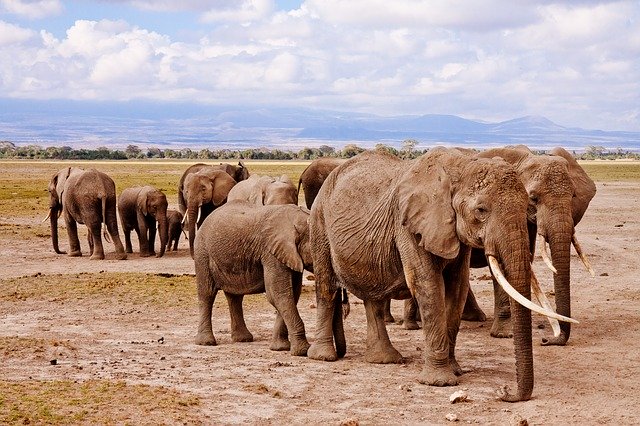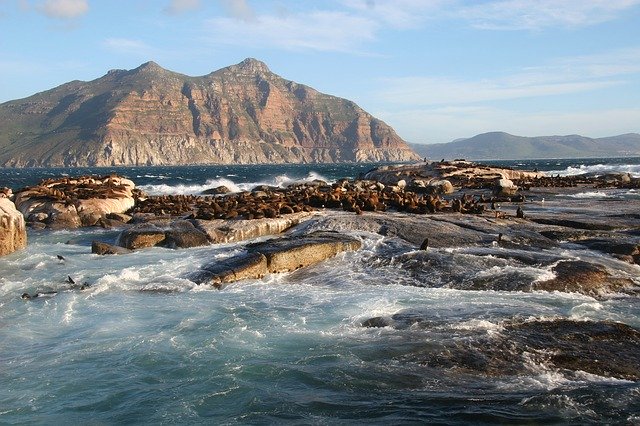A Comprehensive Africa Travel Guide
Africa is the second-largest landmass. It is surrounded by the Atlantic Ocean, the Indian Ocean, and the Mediterranean Sea. The Equator cuts it almost in half in the middle. Cape Verde, Madagascar, Mauritius, Seychelles, and Comoros are all islands that are part of this continent.
Scholars disagree a lot about where the name “Africa” came from. Most people think it comes from Phoenician, Greek, and Roman words. The Egyptian word “Afru-ika,” which means “Motherland,” the Greek word “aphrike,” which means “without cold,” and the Latin word “aprica,” which means “sunny,” are all important words.
You can become a witness to this beautiful place. With the help of the Africa Travel Guide, you can get enough knowledge to explore while maintaining do and don’ts.

Best Places to Visit in Africa
There are lots of places to visit but people might confuse after seeing various options about where to go in Africa. Here are some of the best places to see in Africa for your help and guidance:
Victoria Falls of Zambia/Zimbabwe: It is one of the Seven Wonders of the World. And it is the largest waterfall on the planet once in a lifetime, people should go there.
Serengeti National Park of Tanzania: This is one of the nice places to visit in Africa. Here you can see millions of wildebeest and other animals move across the Serengeti for greener pastures. This African destination is nice. The park is famous for its wildlife and African scenery.
Maasai Mara National Reserve: Another remarkable location for witnessing the Great Migration, Maasai Mara is famous for its thriving wildlife, including lions, elephants, and cheetahs. The reserve offers unparalleled opportunities for wildlife photography and unforgettable safari experiences.
Cape Town of South Africa: This is one of the great places to visit in Africa because it is a vibrant city with a stunning natural backdrop. You can explore Table Mountain, the Cape Peninsula, and the city’s diverse culture, food, and arts.
Zanzibar of Tanzania: This Tanzanian island is known for its beautiful beaches, pure waters, and rich culture. Stone Town, palm-lined beaches, and Swahili cuisine await visitors.
Okavango Delta of Botswana: Wildlife-rich Okavango Delta is an oasis in the Kalahari Desert. A mokoro safari lets you explore this unique habitat and its people.
Kruger National Park of South Africa: Kruger National Park is one of Africa’s best places to see the Big Five animals (lion, elephant, buffalo, leopard, and rhinoceros).
Ngorongoro Crater of Tanzania: The Ngorongoro Crater, a UNESCO World Heritage Site and volcanic crater, is a wildlife haven. Game drives and seeing a healthy environment amid a collapsed volcano are ideal.
Safe places to visit in Africa
Africa have several safe and pleasant travel spots. Several places have low crime rates and are tourist-friendly. Here are some safe places in Africa to visit.
Botswana: Known for its excellent wildlife safaris and well-managed tourism industry, Botswana is considered one of the safest countries in Africa for travelers.
Namibia: With its vast landscapes, including the famous Namib Desert and Etosha National Park, Namibia is a safe places to travel in Africa and also a captivating destination for nature lovers.
Seychelles: This Indian Ocean island nation is renowned for its pristine beaches, turquoise waters, and upscale resorts, making it a safe and luxurious vacation spot.
Mauritius: Amazing water place and calming nature invite tourists to come there. It offers culture and scenery. This place is tourist-friendly and safe.
Cape Verde: This is island of West Africa that offers stunning beaches, vibrant culture, and a reputation for safety and hospitality. This is one of the most safest countries in Africa to visit.
Rwanda and Zambia: Gorilla trekking and other wildlife adventures are safe in this East African country. While Zambia is noted for its friendly hospitality and safe tourism environment.
Ghana: A stable West African nation with a rich cultural legacy, historical attractions, and friendly people.
Tanzania (except some areas): Zanzibar and the northern safari circuit are generally safe for tourists, although other sections of Tanzania may be unsafe.
Mauritania: The Sahara Desert and unique culture of North West Africa’s Mauritania. Travelers should avoid border areas, but the rest of the country is safe.
Best Time to Visit in Africa
Due to Africa’s numerous landscapes and climates, the best time to visit in Africa depends on the location or country you wish to visit. Africa has three travel seasons:
1. Dry Season (Winter): Many African places are best visited in winter, the dry season. June–August is this season. Safaris are easier to notice when wildlife gathers around water sources. South Africa, Botswana, Namibia, and Zimbabwe are popular dry-season destinations.
2. Shoulder Season: Spring (April–May) and fall (September–November) are other great months to explore Africa. These times have milder weather, fewer tourists, and cheaper tours and accommodations. Wildlife safaris in Kenya, Tanzania, Uganda, and Rwanda are ideal during the Great Migration in East Africa.
3. Green Season (Summer): December to March is the southern hemisphere summer or green season. This season has sporadic showers and luxuriant vegetation. The Green season has lower prices and fewer tourists, but thicker foliage makes some creatures harder to spot. Travelers choose Zambia and Malawi in southern Africa.
What is Africa famous for?
Africa is a continent famous for its rich cultural heritage, diverse wildlife, stunning landscapes, and historical significance. Here are some of the aspects for which Africa is renowned:
Wildlife and Safaris: Africa is famous for its wildlife. The continent offers some of the best safari experiences that allow visitors to witness animals in their natural habitats.
Natural Landscapes: Africa is known for its breathtaking landscapes, ranging from vast savannas and lush rainforests to towering mountains and majestic deserts.
Cultural Diversity: With over 3,000 distinct ethnic groups, Africa is a melting pot of cultures, traditions, languages, and music. Its vibrant festivals, art, and cuisine showcase the continent’s rich and diverse cultural heritage.
Ancient History and Archaeological Sites: Africa boasts a wealth of ancient civilizations, including Egypt’s iconic pyramids and the historical sites of Ethiopia. These remnants of ancient cultures offer insight into humanity’s early history.
Victoria Falls: It is one of the most beautiful waterfalls in the world and it is between Zambia and Zimbabwe. This comes under the 7 Wonders of the World.
Nile River: The longest river in the world, the Nile, flows through several African countries and holds significant historical and cultural importance.
Gorilla Trekking: Countries like Rwanda and Uganda offer the unique opportunity to go gorilla trekking and observe endangered mountain gorillas in their natural habitat.
African Art and Handicrafts: Africa is renowned for its vibrant and diverse art, including traditional masks, sculptures, and colorful textiles, which reflect the continent’s rich cultural expressions.
African Music and Dance and Biodiversity: The continent is a center for new music, with styles like Afrobeat, Soukous, and Highlife becoming famous around the world. Africa has a huge number of plant and animal species, including some of the most famous and rare animals in the world.
Top Things to Do in Africa
Many tourists have questions about what to do in Africa. Africa is a great place for tourists who want to try new things, learn about other cultures, and meet animals. There are many things to do but these are top things to do in Africa:
- Cultural Immersion: Visit local villages, experience traditional dances, sample regional cuisines, and interact with indigenous groups to learn about Africa’s rich cultural diversity.
- Balloon Ride: Hot air balloon rides in the Maasai Mara, Namib Desert, or Drakensberg Mountains are a weird and calm experience.
- Explore the Sahara Desert: Ride camels over dunes, camp beneath the stars, and experience the world’s largest desert in Morocco, Tunisia, or Egypt.
- Relax on Pristine Beaches: Zanzibar (Tanzania), Seychelles, Mauritius, and Cape Town (South Africa) have paradisiacal beaches with crystal-clear oceans.
- Hiking & Trekking: Mount Kilimanjaro in Tanzania, the Simien Mountains in Ethiopia, and Table Mountain in South Africa offer spectacular hiking and trekking.
- Explore Ancient History: Visit Egypt’s Great Pyramids, Ethiopia’s Lalibela rock-hewn churches, and Tunisia’s Carthage.
Things to Avoid in Africa
Do you know what to avoid in Africa? Please remember that it’s important for tourists to know what to avoid to ensure a safe and respectful journey.
- Wildlife Encounters: Even tame creatures should be avoided. Wildlife safaris and interactions should be done at a safe distance with qualified guides.
- Public Displays of Affection: Some African cultures frown on public displays of affection. Respecting local customs is crucial.
- Photography Without Permission: Never photograph locals without permission, especially in rural areas or religious sites. Honor their privacy and culture.
- Using Unofficial Guides: Use licensed guides or tour operators for hiking, safaris, and tours. Responsible tourism and safety are ensured.
- Carrying Valuables: Don’t show off your jewelry, cameras, or electronics. Avoid crowds and secure your valuables.
- Drinking Tap Water: To avoid waterborne infections, several places recommend bottled water. Follow local drinking water guidelines.
- Discussing Sensitive Topics: Politics, religion, and local strife are touchy themes. Be open-minded and respectful in dialogues.
Bottom-Line
Africa’s beauty, culture, and variety draw tourists from throughout the world. While on the trip of a lifetime, appreciate the local culture and ecology. Avoiding wildlife interactions, following travel advisories, and dressing responsibly ensure a safe and enjoyable trip.
Openness and understanding create genuine links with African people and customs. Visitors may experience Africa’s wonders—from thrilling wildlife safaris and magnificent landscapes to ancient history and diverse cultures—by practicing responsible travel. Africa’s allure offers a life-changing experience.



